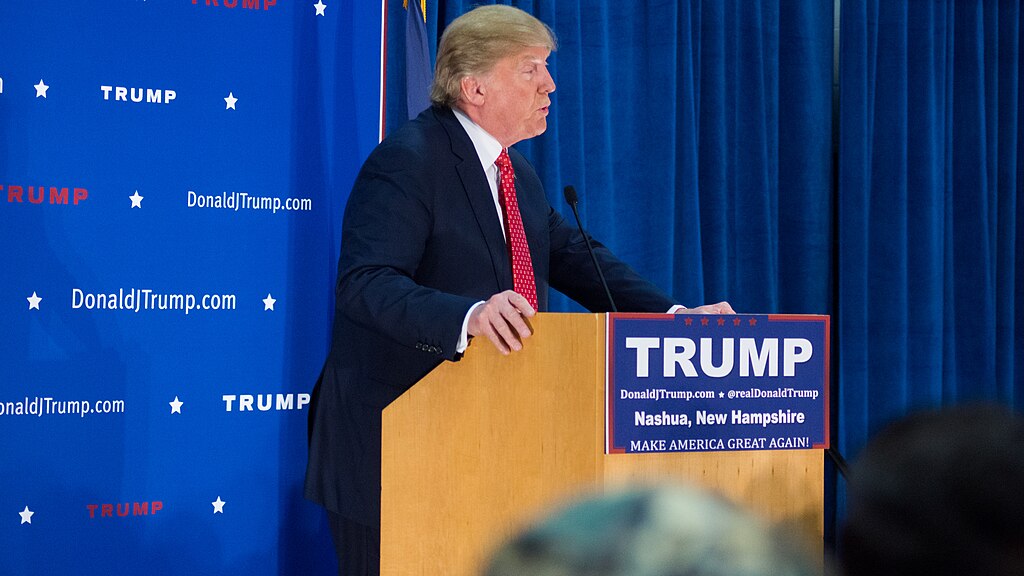As the 2024 election season ramps up, a surprising wave of testimonials from everyday voters is adding an unexpected twist to the national conversation. At the forefront of this shift is a Michigan voter who recently spoke out, challenging the portrayal of former President Donald Trump as “angry” or “fascist.” In a comment that’s quickly gained traction online, the voter dismissed these familiar narratives, saying, “I’ve heard so much about Trump being angry and he’s a fascist and dictator—but problem is, when I listen to him, I don’t hear any of that.”
This voter’s perspective, which reflects growing sentiments in certain regions, underscores a divide between the mainstream media’s portrayal of Trump and the image that resonates with his core supporters. The individual shared his experiences after attending a Trump rally in Michigan, where he claimed to have seen “a completely different side of the former president” than the one often described on major networks and by political opponents.
According to reports, this sentiment has been building among a portion of the electorate who, despite opposing views on Trump’s policies, feel the media may have exaggerated his personality or intentions. Many, like this Michigan resident, cite their personal observations as evidence. “When he talks about America, I don’t hear a dictator; I hear someone who genuinely cares about the people,” the voter explained. This perspective is echoed by other rally attendees who described Trump’s speeches as “direct but caring,” in contrast to the aggressive tone frequently attributed to him.
Political analysts suggest that such statements might indicate a shift in public perception as voters increasingly rely on personal experiences rather than filtered interpretations. “The media is doing what it does best: focusing on controversy and stirring emotions,” said a local commentator on Michigan politics. “But voters are finding their own truths, especially as Trump’s message continues to be focused on ‘America First’ values.”
The voter’s comments highlight a broader theme of disillusionment with conventional narratives. As Trump campaigns across the country, his speeches emphasize a desire to “restore America” rather than overthrow its democratic systems—a talking point that seems to be resonating with those tired of hyper-partisan rhetoric. Supporters at his Michigan rally claimed to have seen “no trace” of the anger or authoritarianism they’d been led to expect, sparking renewed interest in the former president’s message.
Some political experts believe that voters’ skepticism towards the mainstream portrayal of Trump is playing into his favor, as his campaign capitalizes on themes of media bias and alleged “fake news.” For voters like the one in Michigan, this dynamic only reinforces the appeal of Trump’s message as he champions himself as a voice for the “forgotten Americans.”
The individual’s remarks drew both support and criticism on social media, with users weighing in from both sides of the political spectrum. For those who share his viewpoint, Trump represents a contrast to establishment politics rather than a threat. Supporters argue that Trump’s tone signifies a leader with an unwavering stance on key issues, while critics maintain that such perspectives downplay the risks of his political approach.
As the election season progresses, sentiments like those from Michigan are poised to play a significant role in shaping the 2024 narrative. This voter’s straightforward message reflects a crucial component of Trump’s base: those who feel that his actions speak louder than the rhetoric surrounding him.



 Macron Urges Emergency UN Security Council Meeting as US-Israel Strikes on Iran Escalate Middle East Tensions
Macron Urges Emergency UN Security Council Meeting as US-Israel Strikes on Iran Escalate Middle East Tensions  Israel Declares State of Emergency as Iran Launches Missile Attacks
Israel Declares State of Emergency as Iran Launches Missile Attacks  Failure of US-Iran talks was all-too predictable – but Trump could still have stuck with diplomacy over strikes
Failure of US-Iran talks was all-too predictable – but Trump could still have stuck with diplomacy over strikes  Marco Rubio to Brief Congress After U.S.-Israeli Strikes on Iran
Marco Rubio to Brief Congress After U.S.-Israeli Strikes on Iran  Middle East Conflict Escalates After Khamenei’s Death as U.S., Israel and Iran Exchange Strikes
Middle East Conflict Escalates After Khamenei’s Death as U.S., Israel and Iran Exchange Strikes  Trump Says U.S. Attacks on Iran Will Continue, Warns of More American Casualties
Trump Says U.S. Attacks on Iran Will Continue, Warns of More American Casualties  Russia Signals Openness to U.S. Security Guarantees for Ukraine at Geneva Peace Talks
Russia Signals Openness to U.S. Security Guarantees for Ukraine at Geneva Peace Talks  Argentina Tax Reform 2026: President Javier Milei Pushes Lower Taxes and Structural Changes
Argentina Tax Reform 2026: President Javier Milei Pushes Lower Taxes and Structural Changes  Suspected Drone Strike Hits RAF Akrotiri Base in Cyprus, Causing Limited Damage
Suspected Drone Strike Hits RAF Akrotiri Base in Cyprus, Causing Limited Damage  Trump to Address Nation as U.S. Launches Strikes in Iran, Axios Reports
Trump to Address Nation as U.S. Launches Strikes in Iran, Axios Reports  Israel Launches Fresh Strikes on Iran After Death of Supreme Leader Ayatollah Khamenei
Israel Launches Fresh Strikes on Iran After Death of Supreme Leader Ayatollah Khamenei  Israel Strikes Hezbollah Targets in Lebanon After Missile and Drone Attacks
Israel Strikes Hezbollah Targets in Lebanon After Missile and Drone Attacks  Iran Supreme Leader Ayatollah Ali Khamenei Killed in Israeli, U.S. Strikes: Reuters
Iran Supreme Leader Ayatollah Ali Khamenei Killed in Israeli, U.S. Strikes: Reuters  U.S.-Israel Strike on Iran Escalates Middle East Conflict, Trump Claims Khamenei Killed
U.S.-Israel Strike on Iran Escalates Middle East Conflict, Trump Claims Khamenei Killed  Trump Launches Operation Epic Fury: U.S. Strikes on Iran Mark High-Risk Shift in Middle East
Trump Launches Operation Epic Fury: U.S. Strikes on Iran Mark High-Risk Shift in Middle East  Australia Rules Out Military Involvement in Iran Conflict as Middle East Tensions Escalate
Australia Rules Out Military Involvement in Iran Conflict as Middle East Tensions Escalate  Trump Announces U.S. Strikes on Iran Navy as Conflict Escalates
Trump Announces U.S. Strikes on Iran Navy as Conflict Escalates 































